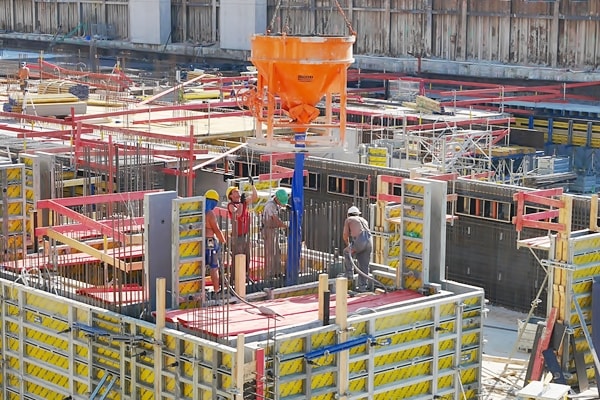Construction Financing
Importance of Borrower's Personal Net Worth and Capital for Construction Financing
Construction financing lenders require comprehensive information regarding the borrower’s personal net worth, reserve fund, and available capital for the project. This information serves multiple purposes, including the following:
Accounting for Allowances: During the design phase of a project, there may be changes or modifications that occur. These changes, excluding scope increases, need to be accounted for by construction financing lenders.
Contact Us
Contact us discuss financing for your construction project.Consideration of Cost Increases: From the estimate date to the project tender date, costs may experience fluctuations. Lenders need to assess these potential increases and evaluate the borrower’s financial capacity to handle them.
Managing Change Orders: Throughout the construction period, there may be instances where change orders are necessary. Lenders take into account the borrower’s available capital to ensure they can accommodate these changes.
By understanding the borrower’s personal net worth, reserve fund, and available capital, construction financing lenders can make informed decisions about loan approvals and tailor financial solutions to meet the borrower’s needs.
The Soft Costs of Construction Financing
Understanding the Components of Soft Costs in Construction Financing
In the realm of construction financing, one often hears the term “Soft Costs,” referring to a variety of expenses that are crucial but not directly associated with physical construction. These costs encompass several key elements that play a significant role in the overall success of a construction project. Common examples of soft costs include architectural fees, engineering fees, legal fees, land surveyors’ fees, administrative costs, marketing expenses, land transfer taxes, assembly fees, land taxes during construction, sewer levies, soil tests, brokers’ or leasing commissions, appraisals, surveys, development charges, and site or construction levies.
Soft costs typically include a range of expenditures that are vital for project planning, management, and completion. These costs may consist of architectural and engineering fees, permits and inspections, legal and professional services, insurance, project management fees, and marketing expenses. Each of these components plays a significant role in facilitating the smooth execution of the construction project.
Architectural fees cover the cost of designing and planning the construction project. Engineering fees, on the other hand, involve the technical aspects of the project’s design and implementation. Legal fees are incurred for legal consultations, contract drafting, and ensuring compliance with regulations. Land surveyors’ fees are necessary for surveying and mapping the construction site accurately.
Legal and professional services encompass legal consultations, contract drafting, and other professional advice required throughout the construction process. Lenders evaluate these costs to ensure that the borrower has access to proper legal representation and guidance. Insurance costs cover various policies, such as liability insurance and builder’s risk insurance, to protect the project from unforeseen risks and liabilities.
Project management fees are incurred to oversee and coordinate the construction activities. Lenders assess these costs to ensure effective project management and timely completion. Marketing expenses are crucial for promoting the project and attracting potential buyers or tenants. Lenders consider these costs to evaluate the borrower’s marketing strategy and the potential return on investment.
Understanding and accounting for soft costs are vital for lenders in construction financing. By thoroughly analyzing these expenses, lenders can accurately assess the borrower’s financial capacity, determine the appropriate loan amount, and ensure that adequate funding is available for the project. Proper consideration of soft costs minimizes the risk of underfunding, delays, or cost overruns, thereby increasing the likelihood of a successful construction project.
Administrative costs encompass various expenses related to the management and coordination of the project, including developers’ head office expenses and other administrative overheads. Marketing expenses play a crucial role in promoting the project, attracting potential buyers or tenants, and establishing a strong market presence.
Soil tests are conducted to assess the composition and suitability of the land for construction purposes. Brokers’ or leasing commissions may be incurred for securing tenants or buyers for the completed project. Appraisals and surveys provide valuation and assessment of the property, aiding in determining its market worth and potential profitability.
Development charges are fees imposed by local authorities for infrastructure development and community enhancements. Site or construction levies cover costs associated with site preparation, infrastructure development, and public utility connections.
Additional soft costs include land transfer taxes, assembly fees (if applicable), and land taxes during the construction phase. These expenses vary depending on the location and specific project requirements. Sewer levies and other impost charges are often necessary for connecting the project to public utilities and infrastructure.
Understanding the components of soft costs is crucial for both borrowers and lenders in construction financing. These expenses need to be carefully evaluated and accounted for to ensure that the project is adequately funded and all necessary aspects are considered.
In conclusion, soft costs encompass a wide range of essential expenses that are integral to the success of a construction project. Lenders must carefully evaluate these costs when providing construction financing to borrowers. By understanding the significance of soft costs and accounting for them adequately, lenders can mitigate financial risks and facilitate the smooth execution of construction projects.
Construction Financing Land Costs
Construction financing involves various aspects of land costs that must be carefully considered by borrowers and lenders. These costs encompass not only the acquisition of the land itself but also additional expenses related to site services, landscaping, roads, sidewalks, interim financing, and more. Evaluating and accounting for these land costs is crucial for successful construction financing.
In addition to the general land costs, there are project-related expenses that need to be accounted for. These costs may include special considerations for the foundation, such as piles, caissons, shoring, underpinning, rock blasting, and hazardous materials removal. Environmental factors like contaminated soil, brownfield sites, asbestos, and the need for environmental remediation also fall under project-related costs.
By carefully assessing these various land costs and project-related expenses, borrowers and lenders can ensure proper financial planning and budgeting for the construction project. Understanding the intricacies of these costs allows for more accurate estimation of the overall financing needs and helps mitigate potential risks or surprises during the construction process.
Furthermore, addressing project-related expenses related to the foundation and environmental considerations is crucial for the successful execution of the construction project. By accounting for these costs upfront, borrowers can avoid delays, cost overruns, or other complications that may arise if these aspects are overlooked.
In summary, construction financing involves not only land acquisition costs but also a range of additional expenses related to site development and project-specific requirements. Proper evaluation and accounting of these land costs and project-related expenses contribute to effective financial planning and support the smooth progress of the construction project.













